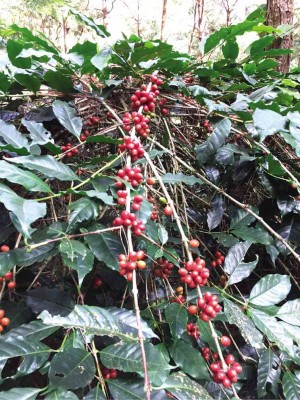Coffee farmers, entrepreneurs challenged to raise local output
Domestic output of coffee beans is shrinking, but coffee evangelists see this as an opportunity for farmers and entrepreneurs to find their niche and move up the value chain.
The volume of production is dropping as destructive typhoons that ravaged the country over the past two years continue to exact a toll on farms.
According to the Philippine Statistics Authority (PSA), domestic output eased by 4 percent in 2014 to settle at about 75,000 metric tons.
The lingering effects of the devastation will also cast a shadow on farm output in 2015, which the Philippine Coffee Board Inc. (PCBI) said would see a further reduction in coffee output.
A 2014 yearend report from the PSA show that the total area of farms planted to coffee increased to 117,300 thousand hectares from 116,460 thousand hectares in 2013.
However, the number of coffee bearing trees decreased to 79.87 million from 80.28 million previously.
The PSA blamed this on the cutting or pruning of old and less productive trees and the effects of heavy rains and strong wind during fruit development in Sultan Kudarat as well as in Talipao, Sulu.
In Kalinga, trees are still recovering from stress brought about by Typhoon “Labuyo” that struck in August 2013. The situation is similar in Capiz and Iloilo, which were in the path of Supertyphoon “Yolanda” in November of the same year.
Crop-shifting also pushed down output in Cavite, where farmers turned to pineapple. In Compostela Valley and Davao City, farmers shifted to bananas.
In Batangas, coffee farms endured a long dry season that coincided with the flowering of trees, while some productive trees were infested by scale insects.
PCBI chair Nicholas Matti said the expected lean harvest this year was exacerbated by extreme weather conditions such as drought and typhoons, depending on where the farms are.
The PCBI has thus urged farmers and entrepreneurs—especially those based in Cavite—to produce higher-value gourmet or specialty robusta, to make up for the decreasing volume.
Gourmet coffee beans will attract specialty roasters and command a price higher than the prevailing P90 to P100 per kilo for the regular robusta or barako, the PCBI added.
Matti said the PCBI determined that the quality of coffee made from locally grown beans had been consistent for many areas due to a lack among many farmers of technical knowledge on primary processing—
especially with regard to the correct fermentation of beans that are processed through the washed method.
“There is also a lack of the right processing equipment like pulpers and hullers,” Matti said. “Farmers have to do manual hulling to be able to sell the green beans.
In a bid to remedy the situation, PBCI has partnered with the Peace and Equity Foundation (PEF), which has available financing packages for nonprofit organizations who have already started a coffee growing business.
Affiliate Peace and Equity Holdings, for its part, has a similar program for coffee growers who are ready to transition into commercial production.
Each of the two lenders has a kitty of P500 million for activities related to five crops, including coffee.
Roberto Calingo, PEF executive director, said coffee farmers currently represented a small part of their borrowers. However, the group is actively searching for more qualified coffee-based clients, who can borrow up to P10 million.
Meanwhile, Nestlé Philippines Inc. (NPI) has expanded its network of coffee bean buying stations with new sites in Batangas, Cavite and Iloilo, which together are expected to benefit some 5,500 farmers.
Edith de Leon, senior vice president and head of corporate affairs at NPI, said that the move was part of efforts to give smallholder farmers an efficient farm-to-market route as well as local training for better plant propagation and production.
“By sourcing directly from local farmers, we are not only assured of long-term supply of the right quantity and quality of green coffee [beans] on which our brands depend, but it also [provides] a robust coffee livelihood for our small farmers,” de Leon said.

